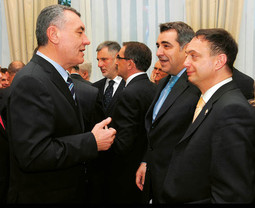MUDRINIC AND VIDOSEVIC The president of the board at HT and the head of the CCE are openly demanding of Government the urgent implementation of anti-recession measures (in the photo with the president of the board at INGRA, Igor Oppenheim)"Prime Minister Ivo Sanader is exceedingly perturbed by the attacks he experienced last week from the head of the Croatian Chamber of Economy (CCE), Nadan Vidosevic, and the president of the board of Croatian Telecom (HT), Ivica Mudrinic. Sanader has characterised the actions of Mudrinic and Vidosevic as an act of treason," Nacional has learned from a source from the top echelons of the Croatian Democratic Union (HDZ), who described the dramatic discussion the Prime Minister had with his close aids. The general conviction in the party at this point in time is that, besides having fallen out of the Prime Minister's graces, Mudrinic and Vidosevic cannot count even on the support of most of the HDZ rank and file.
On the other hand, Mudrinic and Vidosevic enjoy the support of business people. Sources close to the Croatian Employers' Association claim that Vidosevic's public statement, in which he criticised Government's economic policy, was coordinated with Mudrinic and the Croatian capitalist's interest group.
Now Mudrinic and Vidosevic have to be ready to pay the price of having made public their political ambitions. Sanader demonstrated his newly gained animosity towards Mudrinic some ten days ago when he denied the possibility that he might join the ranks of Government saying "the wish is father to the thought."
Mudrinic's close associates confirmed that the HT boss seriously counted in the possibility that he might in the near future enter the ranks of Government as a deputy prime minister, into Damir Polancec's seat, in fact. There was a lot of talk of this before Christmas. The expected outcome was Sanader's nomination for the job of President of the Republic at the 2010 elections and Mudrinic's takeover of the office of Prime Minister.
It is hardly likely that a politician and businessman with his experience would openly discuss his ambitions, and that, as we have learned, HT would already be considering reorganising its operations after his departure, had Mudrinic not gotten the nod from Sanader. In the meantime Mudrinic received a concrete offer to take over the transport and communications portfolio, which would be separated from the ministry led by Bozidar Kalmeta, an offer he turned down.
That was followed by Mudrinic's February 3rd interview for Business.hr in which the president of the board at HT vehemently attacked Government. He gave this year's budget a very poor rating, and accused Government of showing a lack of leadership, which the press interpreted as a direct attack levelled at Sanader.
Vidosevic, for his part, became the second member of the "treasonous" duo after last week's press conference at which he presented the CCE's proposals of measures to resolve the crisis, and at which he concluded that the crisis would last ten years, calling all those who say otherwise liars. Vidosevic, who had earlier criticised the economic policies of Government and the Croatian National Bank (CNB), has frequently attacked the kuna exchange rate policy, which is in his opinion overvalued and harmful to exporters. This time he for the first time called for an urgent reduction of the budget, by ten percent, and proposed some other measures that for the most part dovetail with the most frequent proposals being put forward by business people. This kind of open attack on Government's economic policy could not pass unpunished, especially in combination with Vidosevic's ambitions regarding the presidential nomination, which has been in the works since early in 2008.
Not a single serious media analyst failed to notice that Finance Minister Ivan Suker came down hard, promptly and precisely on Vidosevic after his press conference. Among other things he said that there could be no rebalancing of the budget without making cuts to wages, pensions and healthcare. He admonished Vidosevic personally, saying that he had said nothing of the crisis up to now, even though the problems started five months ago, and laughed off his forecast of a decade-long depression, saying that all experts were forecasting a recovery as early as 2010. These kinds of direct attacks from the top levels of Sanader's administration do not come by chance.
Nacional's source close to the top ranks of the ruling party is convinced that Sanader considers Mudrinic's and Vidosevic's ambitions unrealistic, but says it is possible that Sanader may first have given them some kind of hint of support to draw them out, and is not out to destroy them politically.
A humorous article in Sunday's edition of the Vjesnik daily can be seen as part of such a nascent campaign. In it Mudrinic's 1992 sins are drawn out of the closet, there is speculation as to the size of his monthly salary, while Vidosevic is implicitly proclaimed the advocate of a planned economy. From the top ranks of the HDZ we have learned that there are plans to make public information concerning Vidosevic's costly art collection, and his hand woven silk rugs, of which it will be said that he paid from 75 to 100 thousand euro a piece for them.
Over the coming weeks Sanader will depend more and more on the support of the media houses he has control of, of which there is a growing number. Nacional has learned that there is particularly intensive work these days on strengthening control over Croatian Television. This move on Sanader's part appears particularly absurd in light of the information Nacional has come into according to which Mudrinic will come under media attack on the basis of the fact that Croatian Television (HRT) served the interests of the HDZ right wing while he was at the helm of the TV company.
The press will be especially important to Sanader because he will no longer be able to count on the support of business people. In private conversation business people from various sectors of the economy have said that their companies saw a dramatic drop in turnover in January, from thirty to seventy percent year over year. Over the coming weeks Mudrinic and Vidosevic will get more powerful allies from the private sector. The longer concrete anti-recession measures are put off, the more business people will be forced to publicly censure Government.
"It is time for Prime Minister Sanader to start acting like a statesman. It is time for him to admit that we are in a recession and to adopt concrete measures," was the reaction of one unhappy Zagreb capitalist to Finance Minister Ivan Suker's latest acrobatics. At issue is a deal hammered out with the Croatian National Bank and commercial banks to cut mandatory reserves from 28.5 to 25 percent. This freed up 840 million euro, of which the banks will only inject 100 million into the economy, while most of money will be loaned to the state at 6.9 percent interest over two years.
In this fashion Suker has secured himself peace of mind for six weeks, at least as far as reprogramming the national debt is concerned. When that time is up, in early April, Suker will have to find another billion, and perhaps two billion, to bridge the period up to the local elections in May. He will not be able to get that from the CNB, because Governor Zeljko Rohatinski has decided that that is the last measure he will undertake to ease Government's position, Nacional has learned from financial sources. Suker will have to find the money on international capital markets, and they have already started feeling out the interest of large European banks and institutions for these kinds of arrangements. As we have learned, Suker is convinced that his campaign will be successful. In this way Suker could, after the elections, seek help from the International Monetary Fund and accept the measures the IMF is certain to demand, including a wage PRIME MINISTER IVO SANADER can expect increasingly overt attacks from business people over the coming weeksfreeze, slashing social contributions and a rebalance of the budget.
Suker will, however, have his six weeks of peace only as regards the state's foreign debts. Planned budget revenues are very uncertain. In the first two weeks of January a deficit of 67 percent was recorded year over year, but most of that deficit can be attributed to the psychological state of a society on the brink of a crisis. The real situation will not be known until after February and March.
Most business people feel that budget revenues will be weaker than planned and that a rebalance is inevitable. That is one of the four key measures business people are advocating as indispensable to avoid economic collapse. A wage freeze is second in line, i.e. abandoning the wage hikes the unions forced Government into. Employers are in general demanding of Sanader that he take a harder line with the unions. The third measure is abandoning large scale public spending undertaken for populist reasons. The fourth measure would involve freeing up a part of the money to stimulate entrepreneurship, either by way of the Croatian Bank for Reconstruction and Development (HBOR), or through other channels. It is quite clear that these measures are unavoidable, but the effect would be much better if they were implemented immediately, and not after negotiations with the IMF start in May.
Along with these four key measures, business people are advocating implementing at least some of the smaller measures that have been proposed of late by, for example, the Social Democrat Party (SDP) or the Economic Institute. They include a reduction of para-fiscal levies such as the fees for the environment or monumental heritage, excise taxes on the use of mobile phones and so forth.
FOUR URGENT MEASURES BUSINESS PEOPLE ARE DEMANDING
■ A rebalance of the budget: business people are convinced that the planned budget revenue will not be achieved and that a rebalance is inevitable
■ A wage freeze: employers are demanding Government take a harder line with the unions
■ Putting off investments: grandiose and populist state projects need to be shelved
■ Freeing up money for entrepreneurship: business people are demanding that a part of the capital be freed up and injected into the economy through the HBOR or other channels
THE IMF DOES NOT HAVE ENOUGH FOR EVERYONE
■ According to the information Nacional has received from financial sources, the Ministry of Finance will probably have to turn to the IMF for help after the local elections in May. To date the IMF has shelled out 47.9 billion US dollars in loans to countries like Serbia, Ukraine, Iceland and Pakistan. Last week former World Bank president Paul Wolfowitz said that the IMF and similar institutions are not in a position to deal with the global financial crisis because their resources cannot cope with the demand. One can only imagine what the situation will be like when Suker does decide to seek help.






